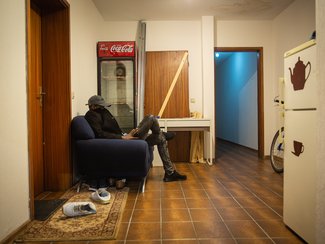
Liban’s Story: Hardship beyond all expectations
Liban is a Somali living in Germany who fled his home when his life was threatened. After a slow, tortuous crossing of the Saharan desert, he twice set out from the Libyan coast, risking the Mediterranean in order to get to Europe. Though he well knew the smuggler’s route through Sudan and Libya was dangerous, what he experienced on the journey was much worse than he expected
“The things I faced on that journey were a hundred times worse than what I was fleeing from. If I think of the struggles and obstacles I have been through, it hurts, so I try not to think of it.”
After passing through Ethiopia and Sudan, Liban entered the Libyan desert. The heat was unbearable, but he hoped to cross as quickly as possible. Instead he and those travelling with him were detained at a place in the middle of the Sahara, where they endured three brutal months.
The traffickers demanded money of those who wished to continue. Those who could not pay were brutally beaten. Liban did not have enough, but his fellow travellers pooled what little money they had and bought his release.
He finally reached the coast of the Mediterranean, where he waited a week for a boat to take him to Europe. Then, after three hours at sea in an over-crowded boat, the vessel capsized and 58 of his fellow passengers perished.
“Dead bodies were floating in the water and birds came flying from the mainland and started eating them. When a fishing boat found us, they alerted the Libyan Coast Guard, who came to the rescue. But the most shocking thing was that before they rescued us, they started shooting at people who were struggling in the water.”
He and the other survivors were returned to Libya and imprisoned. Liban spent one year in detention but managed to flee when fighting broke out between local clans and the prison was seized by a rival militia. Liban returned to the smuggler who had placed him on the boat that capsized to arrange another crossing. Once again, the boat capsized, drowning 25 people. They were again rescued by a Libyan ship, but instead of taking them back, the ship’s captain radioed the Italian Coast Guard, who picked up the survivors and delivered them to Italy.
“So, I have been through many problems in order to reach Europe and that has devastated my life. Twice, I have been on a boat that capsized at sea. The experience hardest to forget is being at sea. I must make myself forget the difficulties and the things I saw, like the floating bodies in front of me. It is not a physical trauma; it is a mental trauma that I feel in my heart.”
